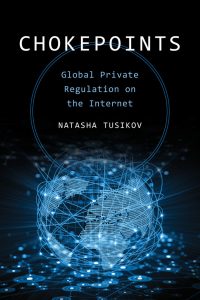Who regulates the Internet and how are vital questions. On January 18, 2012, millions of people participated in the now-infamous “Internet blackout” to protest the Stop Online Piracy Act and the rights it would have given intellectual property holders to shape how people use the Internet. SOPA’s withdrawal was heralded as a victory for an open Internet. Rather than accept defeat, a small group of corporations, tacitly backed by the US and other governments, have implemented much of SOPA via a series of secret, handshake agreements among powerful corporations, including Google, PayPal, and Microsoft.

Assistant Professor Natasha Tusikov
Natasha Tusikov, assistant professor in the Department of Social Science at York University, documents this little-known aspect of Internet governance in Chokepoints: Global Private Regulation on the Internet (University of California Press). In the book, Tusikov examines the role of large Internet firms as global regulators for powerful rights holders of intellectual property like Nike. She traces a series of secretly negotiated, handshake deals struck among Internet firms like Google and PayPal, and rights holders at the behest of U.S. and European government officials.
 Drawing on extensive interviews in Australia, the United States, and the United Kingdom, Tusikov details the emergence of a global regime in which large Internet firms act as regulators for powerful intellectual property owners, challenging fundamental notions of democratic accountability. This book examines the growing role of powerful, U.S.-based Internet intermediaries as global regulators on behalf of states and other multinational corporations. It argues that corporate regulation on the Internet is re-shaping the way that states and powerful corporations control online behavior, concluding that this type of regulation further questions traditional distinctions between the territoriality of law and the non-territoriality of the Internet. For more details, see: http://www.ucpress.edu/book.php?isbn=9780520291225
Drawing on extensive interviews in Australia, the United States, and the United Kingdom, Tusikov details the emergence of a global regime in which large Internet firms act as regulators for powerful intellectual property owners, challenging fundamental notions of democratic accountability. This book examines the growing role of powerful, U.S.-based Internet intermediaries as global regulators on behalf of states and other multinational corporations. It argues that corporate regulation on the Internet is re-shaping the way that states and powerful corporations control online behavior, concluding that this type of regulation further questions traditional distinctions between the territoriality of law and the non-territoriality of the Internet. For more details, see: http://www.ucpress.edu/book.php?isbn=9780520291225
